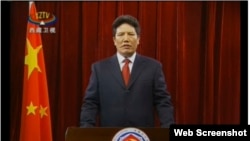China has marked the 55th anniversary of the dismantling of Tibet’s government in Lhasa with another explicit rejection of the so-called "middle way" approach of the Dalai Lama that emphasizes autonomy for the region.
In the televised speech Thursday on state-run Tibet TV, the chairman of China's Tibet Autonomous Region [TAR], Losang Gyaltsen, said the Dalai Lama's approach is "a camouflaged approach" that seeks Tibet's independence.
“Tibet cannot be independent, neither can it be a semi-independence or disguised independence,” Gyaltsen said, standing next to China’s national flag.
He added that China’s fight against a “Western enemy force” and the “Dalai Clique” is an important political fight for unity versus separation, democracy versus authoritarianism, and progress versus backwardness.
Kunga Tashi, who works in New York for the exiled Tibetan government, said the statement shows that Chinese leaders are unwilling to compromise to solve the Tibetan problem.
“The middle way approach agrees with the principle [demand] of China,” he said. “We say we are not separating from China, if we get a meaningful autonomy.”
In addition to the speech Thursday, Chinese officials carried out a campaign this week to highlight how much they say conditions have improved in Tibet since China took over.
Beijing frequently cites improved living standards in the region when defending its rule. Tibetan exile MP Kalsang Gyaltsen Bapa said the comparison of old and modern societies is just an excuse.
“China has no historical and legal support to occupy Tibet,” Bapa told VOA Tibetan service, speaking in Tibetan. “So they need to say old Tibet was dark and backward, and they came to develop Tibet. Such policy was used by other colonizers.”
The anniversary, which China calls "Serf Liberation Day," marks Beijing's 1959 dismantling of Tibet’s government in Lhasa shortly after the Dalai Lama fled into exile. The date, however, has been officially commemorated only since 2009.
This report was produced in collaboration with the VOA Tibetan service.





